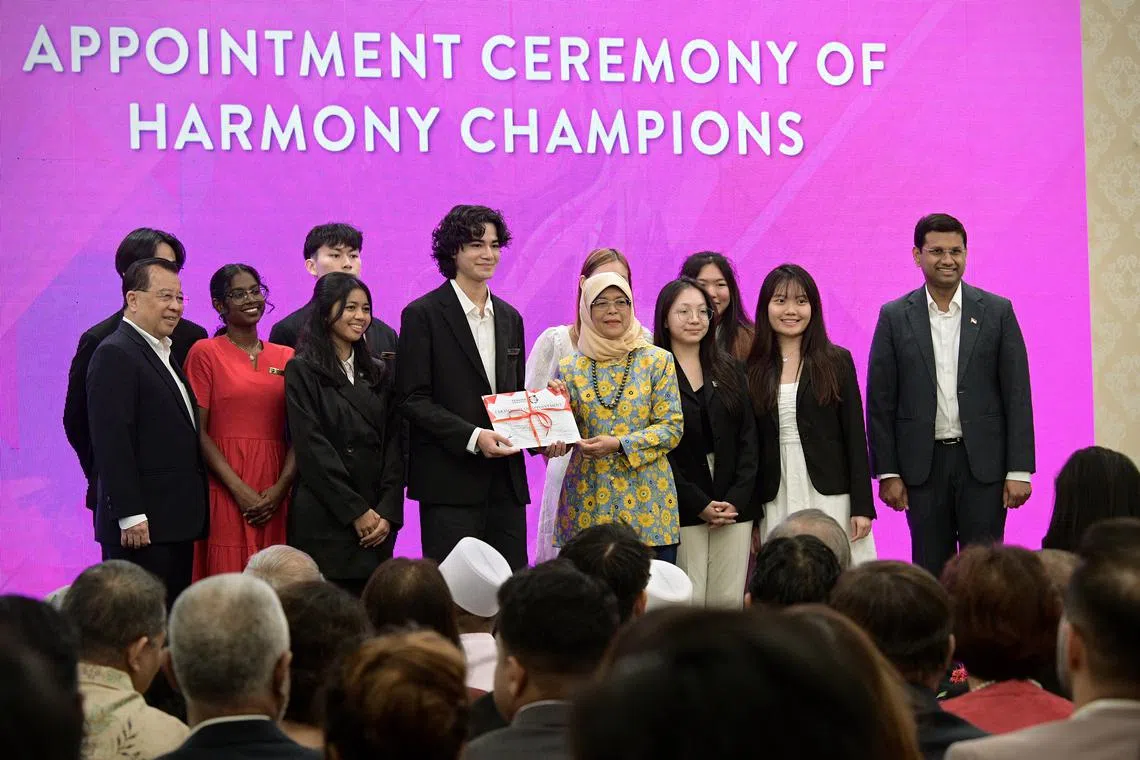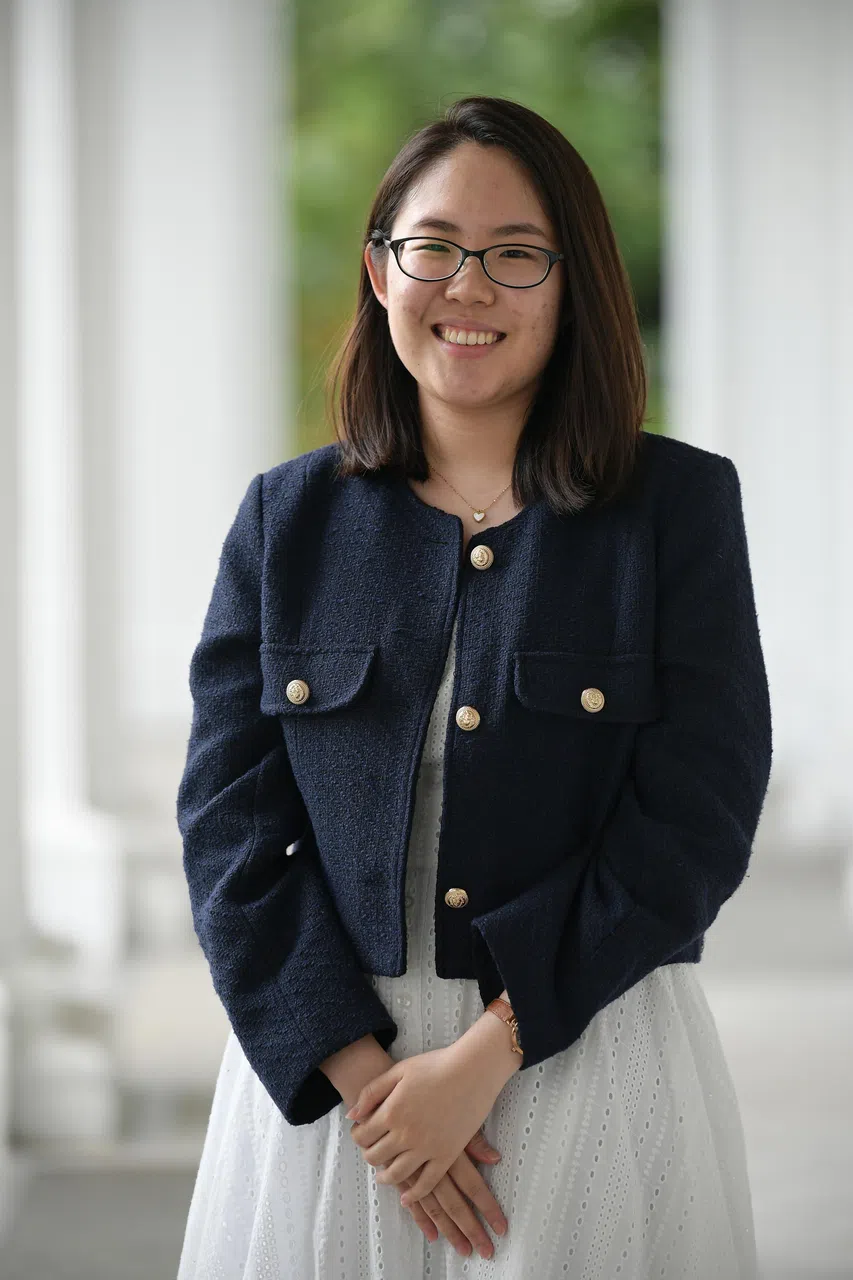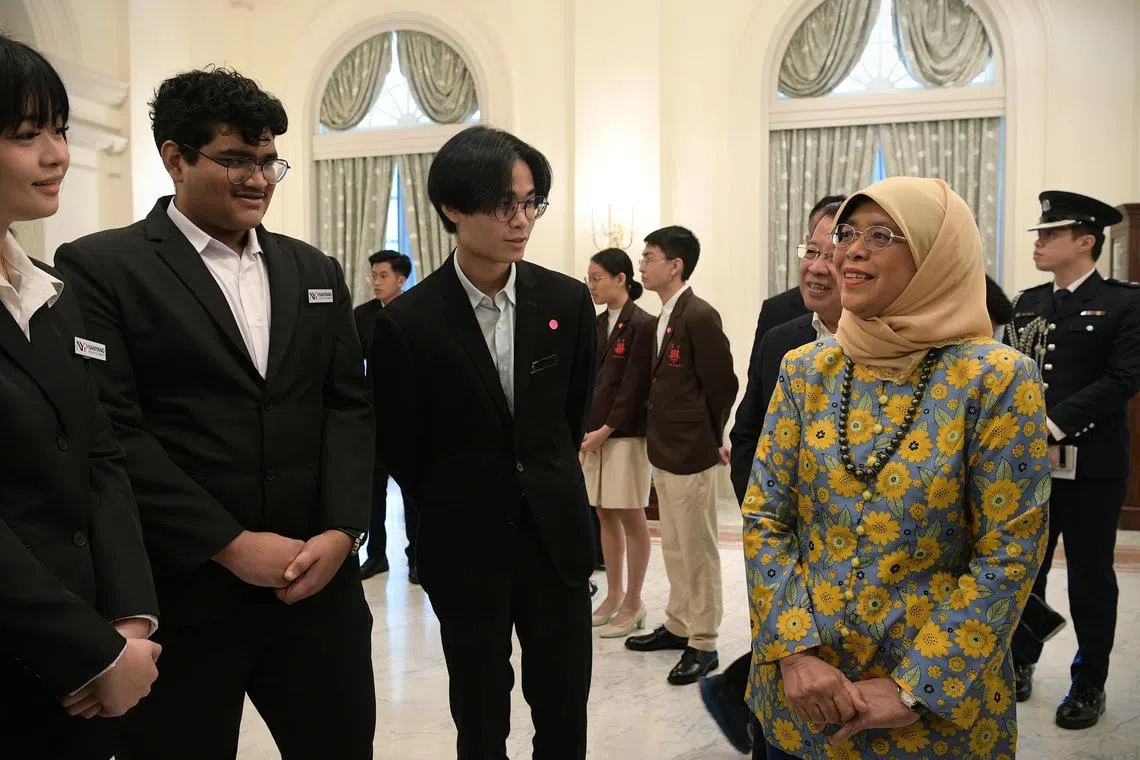New initiative to train youth to be champions of racial and religious harmony
Sign up now: Get ST's newsletters delivered to your inbox

Students from Republic Polytechnic being appointed Harmony Champions by President Halimah Yacob at the Roses of Peace celebration on Feb 26, 2023.
ST PHOTO: NG SOR LUAN
SINGAPORE - To maintain peace and harmony in Singapore, ethnic and religious groups must constantly resist inward ways of thinking and learn to be comfortable with differences, said President Halimah Yacob on Sunday.
“This is the bedrock of our harmonious coexistence. Rather than putting our differences aside, we address them, we learn to live with them, and we celebrate them,” she added.
Madam Halimah, who was speaking at a celebration of the 10th anniversary of interfaith initiative Roses of Peace held at the Istana on Sunday morning, addressed the recent cases of young people being radicalised by materials online.
“Young people, lacking in life experiences, are curious and impressionable and are easily seized by their perceptions of injustices or unfairness in other parts of the world,” she said.
“These feelings are easily exploited by groups bent on recruiting new followers to support their misguided causes.”
The Internal Security Department announced on Feb 21 that two teenagers had been dealt with under the Internal Security Act (ISA)
Madam Halimah suggested providing young people who are concerned about world events with safe spaces to discuss and find out more from experts in the field, who can give them accurate information to counter false and misleading narratives on social media.
To this end, Roses of Peace and Temasek Foundation on Sunday appointed close to 80 Harmony Champions under a new programme to equip young people with deeper interracial and inter-religious understanding.
It will train young people from institutes of higher learning here to facilitate dialogues on race and religious cohesion and champion peace-building initiatives.
One of the newly appointed ambassadors, Ms Michelle Tan, 23, a nursing undergraduate at the National University of Singapore, told the media she was alarmed by the recent spate of news of young people becoming radicalised online.
“It’s very shocking that due to avenues such as social media, youth can still get radicalised this easily, despite us also having been taught in schools how we should be able to discern what’s right and what’s wrong,” she said.

NUS nursing undergraduate Michelle Tan is one of the newly appointed ambassadors.
ST PHOTO: NG SOR LUAN
Through her role with Roses of Peace and the initiatives that she plans to roll out, she hopes she can provide a place for young people to feel accepted.
Following the appointment of the Harmony Champions, a panel fielded questions from participants in the discussion.
The panellists were Ms Nadia Samdin, an MP for Ang Mo Kio GRC; Mr Shaun Goh, senior director of community relations and engagement at the Ministry of Culture, Community and Youth; Mr Christopher Gordon, chairman of the youth committee at the Eurasian Association; and Ms Cynthia Mohan, grassroots volunteer in Chong Pang in Nee Soon GRC.

President Halimah Yacob (right) speaking to newly appointed harmony champions (from left) Cheryln Yang, Vickneswaran Somu Thevar Ramadoss and Blaise Kwok, who are all 19, at the Istana on Feb 26, 2023.
ST PHOTO: NG SOR LUAN
A participant asked if the panellists believe that Singapore needs to implement a law similar to the Patriot Act in the United States to tackle radicalisation in the light of the recent cases of youth being detained under the ISA.
The Patriot Act grants law enforcement more powers to prevent terrorist attacks, including permitting the government to monitor civilians’ phone and e-mail communications.
The panellists urged caution when it comes to adopting legislation used in other countries in Singapore.
Highlighting how individuals want to belong to a group or identify with something bigger than themselves, Ms Nadia said: “More often than not, beyond religious ideology, that is the heart of some of these issues with radicalisation.”
She added: “It really is about that person-to-person kind of networking outreach that we must continue to build, because having a law may not necessarily change that sense of hopelessness and loss and lack of identification, but a group of friends and an understanding and inclusive community will.”



